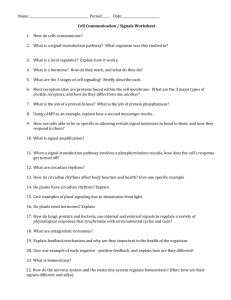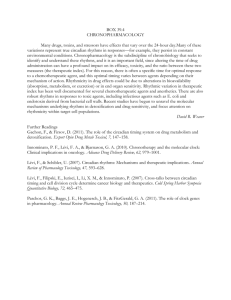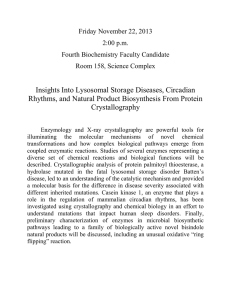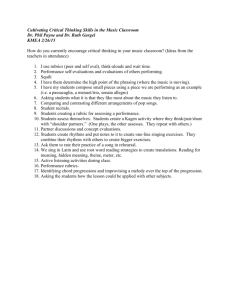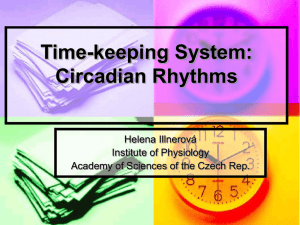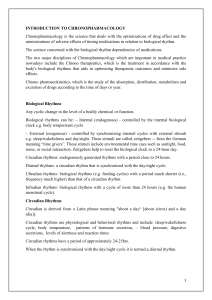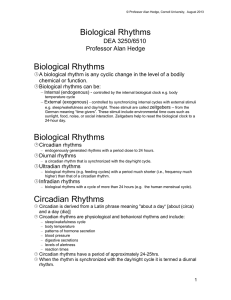Body Rhythms & Mental States Chapter 5: Consciousness
advertisement
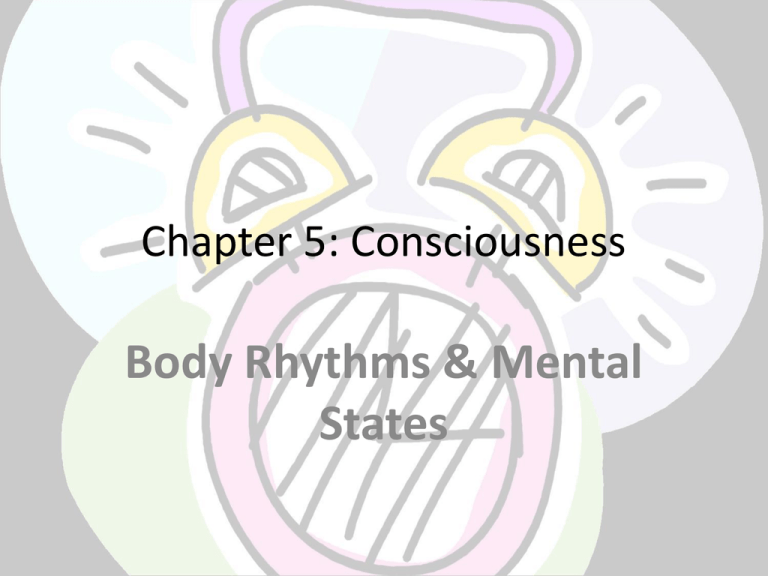
Chapter 5: Consciousness Body Rhythms & Mental States Definition • Awareness of oneself & the environment • Fluctuations in subjective experiences are accompanied by predictable ups & downs in brain activity & hormones Biological Rhythms: The Tides of Experience • A biological clock in our brains governs the waxing and waning of –hormone levels, –urine volume, –blood pressure, –and the responsiveness of brain cells to stimulation. • Many of these rhythms continue to occur even in the absence of external time cues; they are endogenous, or generated from within. • Circadian rhythm- occur approximately every 24 hours –Ex: sleep/wake cycle (best known) –Ex: menstrual cycle • Influence everything from the effectiveness of medicines taken at a certain time to alertness & performance on the job Circadian Rhythms • Exists in plants, animals, insects, & humans • Reflect the evolutionary adaptation of organisms to the many changes associated with the rotation of the earth • To study, volunteers must be isolated from sunlight, clocks, & all clues to time The Body’s Clock • Circadian rhythms are controlled by a biological clock, or overall coordinator. • Controlled by a tiny tear drop shaped cluster of cells in the hypothalamus called the suprachiasmatic nucleus (SCN) • Neural pathways from special receptors in the back of the eye transmit into the SCN & allow it to respond to changes in light & dark • SCN sends out messages to respond to these changes • Other clocks also exist and some may operate independently of the SCN. • For most circadian rhythms, the SCN is regarded as the master pacemaker. When the Clock Is Out of Sync • Under normal conditions, the rhythms are synchronized, just as wristwatches can be synchronized. • Their peaks may occur at different times, but they occur in phase with one another. • If you know when one rhythm peaks, you can predict when another will do so. When the Clock Is Out of Sync • When your normal routine changes, your circadian rhythms may be thrown out of phase with one another. –Internal desynchronization- “Jet lag”, shift work • Sleep & wake patterns usually adjust quickly, but temperature and hormone cycles can take several days to return to normal. –Can be affected by illness, stress, fatigue, excitement, exercise, drugs, meal times, etc. –Differ greatly among individuals because of genetics Moods and Long-term Rhythms • In humans, long-term cycles have been observed in everything from the threshold for tooth pain to conception rates. • Folklore holds that our moods follow similar rhythms, particularly in response to seasonal & menstrual changes. • But do they? Does the Season Affect Moods? • Clinicians report that some people become depressed every winter, when periods of daylight are short, and improve in mood each spring, as daylight increases • This pattern that has come to be known as seasonal affective disorder (SAD) –feelings of sadness, lethargy, & drowsiness • Treated with phototherapy –No conclusive evidence Does the Menstrual Cycle Affect Moods? • Controversy has raged about another longterm rhythm, the monthly female menstrual cycle. • Are these physical changes correlated with emotional or intellectual changes? –Evidence shows physical changes –Emotional symptoms are rare Does Testosterone Affect Moods • The notion that hormones affect mood & performance has rarely been extended to men. • Men’s hormones also fluctuate in a cyclical manner. • There may be a bias to attribute women’s moods to hormones, but not men’s. • High levels have been linked to criminal violence, delinquency, rambunctiousness, sociability, restlessness, elation, sadness, moodiness, aloofness, & being a trial lawyer –Behavior affects testosterone levels as well as the reverse
